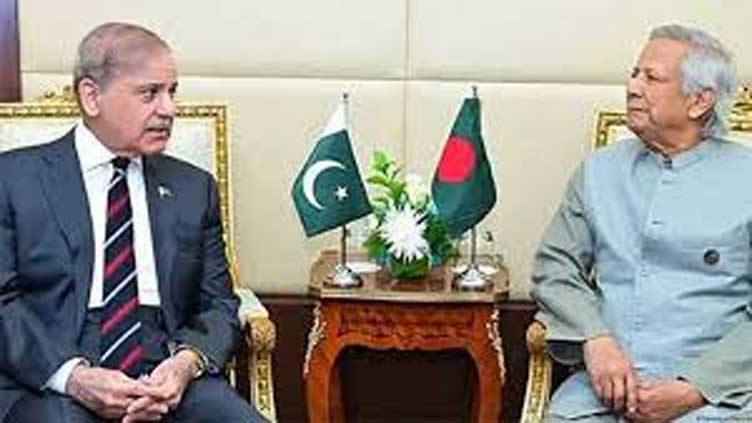Checkmate Delhi: Teaming up against the tide by Pak-Bangla power-pact

Pakistan
Today, we are offered historic chance to heal 1971 wound through strategic unity
By Javed Iqbal
In the wake of heightened tensions following the Pahalgam incident and the subsequent unilateral ‘suspension’ of the Indus Waters Treaty, South Asia once again finds itself at the edge of a precipice.
With skirmishes recently reported across the Line of Control and diplomatic relations fraying at an unprecedented pace, Pakistan must now recalibrate its strategic posture - not just militarily, but diplomatically.
A golden yet urgent opportunity presents itself in the shifting political sands of Bangladesh.
For decades, Dhaka remained under the grip of Sheikh Hasina Wajid, daughter of Sheikh Mujibur Rahman, the man who led East Pakistan’s separation under India's patronage.
Relevant to read: Bangladesh removes Mujibur Rahman's portrait from currency notes
Her government was a close ally of New Delhi, serving not only as a trade partner but as a strategic buffer in India's hegemonic plans. However, the tides of history are once again shifting.
Bangladesh Already Awakened: A New Political Landscape
The massive civilian uprising that led to the deposition of Sheikh Hasina marks a critical turning point. No longer does Bangladesh’s political future lie solely in the lap of Indian policymakers or RAW-supported regimes.
The youth of Bangladesh - conscious of the manipulations that led to 1971’s division and frustrated by India's overreach - has ignited a national soul-searching.
It is in this backdrop Pakistan must act swiftly and wisely to forge an emergency diplomatic and strategic pact with Bangladesh.
This is not just a symbolic move - it is a strategic necessity
The Case for a Pakistan-Bangladesh Alliance: India’s aggressive posturing and its calculated provocation of nuclear-armed Pakistan isn’t isolated. It fits into a broader agenda backed by powerful global actors including Israel and, at times, a complicit West.
The announcement of a temporary ceasefire by President Trump - on the surface, an olive branch - must be scrutinised. It may very well be a tactical ploy, buying time for India to regroup and strike Pakistan’s sensitive installations under international silence.
In such volatile circumstances, Pakistan needs to build a new regional bloc - a moral and strategic alliance with states that understand the dangers of Indian expansionism.
With China already aligned, the inclusion of a post-Hasina Bangladesh would be a regional game changer.
Shared History: Despite the painful events of 1971, the cultural and religious bonds between Pakistan and Bangladesh remain deep.
Both are Muslim-majority nations with colonial scars and shared aspirations of sovereignty and justice.
Geo-strategic Balance: A united front from Pakistan and Bangladesh would corner India both from the west and the east, breaking its confidence and forcing it into diplomatic submission.
More to read: Bangladesh asks India to stop former PM Hasina from making 'false statements'
Counter-Hegemony: India, backed by Zionist and Western interests, seeks to keep the region fragmented and divided.
A renewed Pakistan-Bangladesh alliance would thwart that very design.
Nuclear Deterrence and Strategic Weight: Pakistan remains the only Muslim nuclear power. An alliance with Bangladesh would further legitimise and regionalise Pakistan’s deterrence capacity as not just a national tool, but a regional shield against oppression.
Urgency in Diplomacy: Time Is of the Essence
The window for action is narrow. With India’s militaristic nationalism at its peak and foreign actors using it as a pawn in the “Indo-Pacific” chessboard, Pakistan must act before a broader conflict is ignited.
Diplomats in Islamabad must begin backchannel negotiations with Dhaka’s interim leadership, proposing economic partnerships, security assurances, and cultural cooperation that elevate Bangladesh beyond India’s shadow.
Turning History’s Pages Together
In 1971, India divided our motherland with a conspiracy of propaganda, militarism, and manipulation. Today, we are offered a historic chance to begin healing that wound - not with nostalgia or blame, but with strategic unity and forward-thinking diplomacy.
Bangladesh, under a new leadership free from Indian shackles, can emerge as a partner in peace and strength.
The world must be reminded: South Asia is not India. Its future lies in cooperation, not domination. And in that future, a Pakistan-Bangladesh axis could light the torch of dignity, justice, and sovereignty for the entire Muslim world.
Let us not forget: In 1962, when India lay humiliated before China, we found ourselves distracted by American lullabies.
Also read: India's RAW involved in Jaffar Express attack: Sikhs for Justice
In 1965, when battle beckoned, allies wavered. In 1971, when conspiracies bloomed, Indira Gandhi brazenly declared the death of the two-nation theory in the Bay of Bengal.
But today, the wheel has turned once again and this time, Pakistan holds not hollow promises but the manifest of victory. Our strength is no longer rooted in borrowed assurances but in the unshakable force of faith and national purpose. Our voices echo across the clouds, not as pleas, but as thunderclaps of defiance.
This is the moment to strike deep into the heart of the enemy to unravel its delusions of grandeur, to raze its arrogance into dust, and to set the oppressed valley of Kashmir free.


